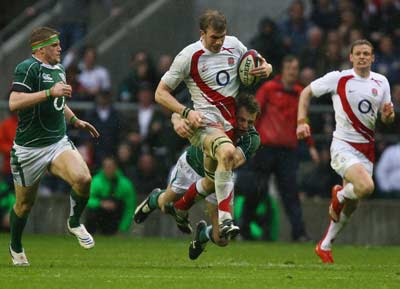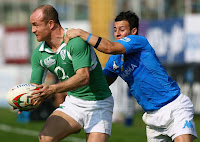 |
| Quinny. Great, fantastic, brilliant. |
None of that came through in his commentary on the Ireland v Wales game on Saturday. It's disappointing, not least because the game is difficult to analyse.
If Ireland were so good, why were Wales within three points of snatching a result at the death? How did Ireland overcome the losses of Henshaw, Henderson and Furlong (to say nothing of Farmer Seán O'Brien)?
Were the replacements so good that suddenly Ireland has discovered a rich seam of international players? Were the missing players maybe not-all-that-exceptional in the first place? Or is it the case that the system is more important than the man in modern rugby, especially in Joe Schmidt's particularly mechanised vision of the ancient game?
These are the questions Quinlan should elucidate for us as the game progresses, not least as modern rugby is so very technical now. Just as the missing nail cost a kingdom, so a man coming in the wrong side of a ruck can now cost a Championship. It's hard to keep up.
It's likely that Quinlan does know all this. He won a lot with Munster when Munster were as gods in Ireland, so he must have figured something out along the way. But whatever that is, he's either unwilling or unable to share with the viewer.
Quinlan's delivery is odd - when he speaks there's a breathless quality to him, like a man whispering at the top of his voice. He's always excited, which is the same as never being excited. He tends to say "Watch Sexton here", or "watch Best here" but never goes on tell us why - either because he's too excited or expects we can discern patterns in the hillocks and drumlins of red- and green-clad beef strewn about the five-metre line without a guide.
Also, for a man who is relatively new to the job, Quinlan has developed two peculiar quirks in his commentary. Quinlan is very prone to the colour commentator's capital error of repeating what the main commentator just said. In an effort to perhaps disguise this, Quinlan elides his remarks to simply listing the players names. "Best, Murray, Sexton, Earls!" he roars. "Sander, Farrell, Sander, Murray!" "John, Paul, George and Ringo!" "Matthew, Mark, Luke and John!"
The more surreal of these quirks is Quinlan's extraordinary reliance on adjectives. This is something he's almost certainly unaware of - who thinks of parts of speech when they speak? - but it is almost certainly unique to him. There are many poor colour commentators - Tommy "Tom" Carr springs to mind - but the adjective stream is a new one on me.
Your correspondent was watching the game for the first twenty minutes before the penny dropped about Quinlan's reliance on adjectives. After that, to keep score on each one was, with me, the work of the next sixty minutes.
Alan Quinlan used fifteen different adjectives to describe play in those sixty minutes. There is a case to be made that he used sixteen, if you consider "what a" an adjectival form - what a kick, what a pass, what a tackle. Sadly, it took me a little too long to twig and I did not keep score of that one. I'll be ready again.
On the others, he used seven adjectives once and once only - bad, big, effective, impressive, incredible, super, and tremendous.
Huge and massive were called to the front twice. Wonderful was used three times, dangerous five, good eight, fantastic eleven, brilliant twelve and, the clear winner with thirty-four carries across the gain-line was great. Great kick, great catch, great tackle, great offload, great ruck, great maul. And so on and on and on.
The Quinlan adjectives are relentlessly positive. The only negative adjective Quinlan used in those sixty minutes was bad, and he only used it once.
Quinlan used dangerous five times but, in rugby, that can be seen as a compliment. Whenever Quinlan himself was described as dangerous in his playing days, it was always meant as a compliment - unless used by the citing commissioner, of course. From this we can only conclude that not only has Alan Quinlan taken some sort of Positive Thinking course, he's come out the other side. Brilliant.
Back in studio, Shane Jennings is a thoughtful analyst but, in an unfortunate echo of international career, he struggles to get noticed above the sulphurous hot air of his gasbag co-analysts. Reader, your humble correspondent would happily spend an hour listening to the Minister for Finance, Mr Pascal Donaghue, TD, extemporise on the Irish income tax bands viz-a-viz European tax harmonisation with particular regard to corporation tax and the liquidity of the sovereign than ever hear one more word on the subject of rugby from either Shane "Shaggy" Horgan or Matt "Maddie" Williams. At least neither Franno nor Hookie have made their way to Ballymount - a small mercy for which a nation offers its grateful thanks.

















